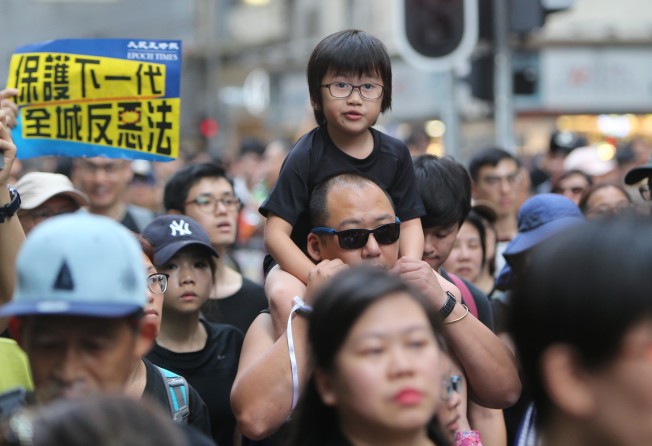Protest violence should not be the focus. Young or old, Hongkongers just want a better government
- The spotlight on youth discontent diverts attention from the fact that a wide cross-section of society are asking for a bigger say in Hong Kong
- When peaceful demands go unmet, some will turn to violence, as some youngsters have done

There is a reality for most people starting in their 30s – they just don’t have the energy they once had. From that age, especially in a city where sedentary desk jobs proliferate, bodies begin falling apart, weakening muscles leading to aches and pains. Hardly surprising, then, that the only ones left standing after Hong Kong’s hours-long street protests were the younger ones, some of whom went on to confront the police, leading to violence.
It is the youngsters to whom the authorities have turned their attention in searching for reasons and solutions to a perceived age-specific problem. But they are either blind or intentionally avoiding the issues; those seeking changes from the government and the way it controls Hong Kong are a wide cross-section of society.
That was obvious from the mammoth Sunday protests on June 9 and 16, the latter claimed by organisers to be double the size of the first with two million marchers. I did not take part, putting journalistic neutrality first, but know of plenty of people who have and are eager to continue as the rallies move from district to district. They and their friends are from all age groups and include students, young couples with toddlers, the young and the middle-aged, the disabled and disadvantaged, and the elderly.
Their grievances are equally diverse, but their ultimate concern is the same – that the government is ignoring their demands. The extradition bill behind the protests that Chief Executive Carrie Lam Cheng Yuet-ngor has now pronounced “dead” is just one; who would willingly face an accusation on the mainland, where basic rights are not guaranteed or protected? The manner in which Lam tried to push the law through without proper public discussion was equally alarming. Calls for universal suffrage re-emerged and with them other long-standing complaints about unaffordable housing, long working hours, poor air quality and the like.
Given so much discontent, it is troubling that the discussion from on high is instead focusing on young people. There are searching questions: Why are they so unhappy? What is driving the minority among them to increasing belligerence and violence? Why do they apparently disrespect authority and especially the police?
This is the same routine as after the Occupy movement in 2014, with the reason for the agitation being ignored in favour of trying to find what was causing the city’s youth to become, in the words of the government, “radical”.
There is no need for committees or panels or research as the answer is simple. Peaceful protests, whether in Hong Kong or elsewhere, rarely lead to demands being met. Global demonstrations of hundreds of millions in 2003 to prevent governments from joining the United States in its wrongful war in Iraq were unsuccessful.
Too often, only violence gets attention, the most recent example being the yellow vest protests in Paris that led to government concessions. Little wonder, then, that after the Lam administration inadequately handled the demands of protesters, violence broke out and escalated, eventually leading to the trashing of the Legislative Council chamber.
There is talk of Lam offering cash handouts to citizens or even cheap housing to younger people in her upcoming policy address. But bribery will not make the city’s problems go away.
At the root is fairer and more representative government. The Basic Law does not guarantee that; of democracy, it only says that Hong Kong should try to work towards that goal with the choosing of the chief executive, who, regardless, still has to be appointed by Beijing.
If the authorities want the violence to go away, they have to start listening to the people who are protesting, not just the small number of young people with energy and able bodies willing to push the limits. Giving up power is never easy for those who have enjoyed it for so long, but concessions have to be made to allow Hongkongers to have a bigger say in the city they call their home and to which they are the financial lifeline and future.
Peter Kammerer is a senior writer at the Post